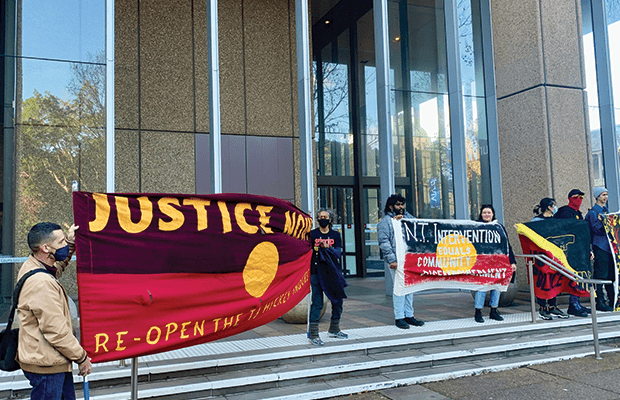Content warning: This article contains the names of, and references to, deceased members of the Indigenous community that may cause distress.
Hundreds of protesters gathered at Sydney Town Hall on Saturday as part of a nationwide call for Kurrinjarla Muwajarri, an indefinite police ceasefire in remote Indigenous communities.
The call follows the recent acquittal of Northern Territory policeman Zachary Rolfe in March on a murder charge. After a five-week trial, Rolfe was found ‘not guilty’ by an all-white jury for the fatal shooting of 19-year-old Walpiri man Kumanjayi Walker, who was shot three times by Rolfe during an attempted arrest in the Yuendumu Community in 2019.
This NT Supreme Court’s decision renewed calls for a National Day of Action against armed police and Black deaths in custody. Led by Walpiri Elder Ned Jampijinpa Hargraves, the call to march on 18 June holds historical significance, as the date marks 15 years since the NT Intervention was introduced by the Howard government in 2007.
The Intervention suspends key laws that upheld the self-determination of First Nations people. This includes the Racial Discrimination Act 1976, Aboriginal Land Rights Act 1976 and the Native Title Act 1993. As a result, communities face increased police presence, “paperless arrests,” the removal of customary law from criminal trials and unconditional government access.
Members of the local Eora Nation, led by Auntie Rhonda Dixon-Grovenor, welcomed the crowd to Gadigal Land and extended a special invitation to the Walpiri Nation, many of whom had travelled from Central Northern Territory for the rally.
“When you kill one of our young people, or any of our people, we all hurt, because we are all connected. And that’s why we are here today, to support our Yuendumu people and share with them in their sorry business” said Auntie Rhonda.
“We’re here for the union. To call on the police and the justice system to stop. Stop murdering our people, stop destroying families and killing our young ones,” she said.
The Intervention, known as NTER (Northern Territory Emergency Response) was pointed to by the Walpiri Nation and fellow NT communities as the cause of increased police violence against Indigenous people.
Testimonies from the families of Mark Mason Senior, Stanley Russell and David Dungay Junior were shared between a reading of the Yuendumu Demands by Gumbaynggirr Dhanghutti Bundjalung, woman Elizabeth ‘Lizzy’ Jarrett.
“We demand that Northern Territory [Police] be defunded at large. Funds should be redirected to community-controlled alternatives like night patrols and community mediation that have proven time and time again that we are the best equipped to keep ourselves safe,” said Jarrett.
Speakers also directed the call for change at the Australian media, an institution that has “put our loved ones on trial through defamation, racialisation, stereotyping and blatant lies,”
“The racist media propels racist violence in the streets and our people suffer. Racism in the media causes our people pain” said Jarret.
The Walker family has felt this pain as they deal with the invasive portrayal of Kumanjayi whilst grieving his death. Investigative reports and the release of video footage of the shooting have also been published without the consent of his family. Such actions directly defy the customs of “sorry business;” wherein the names and photographs of the deceased are restricted during mourning.
These actions have led to specific appeals within the Yuendumu demands for a Black Media Watch, the immediate takedown of defamatory content about Walker and accountability for journalists to follow “a cultural safety framework, local protocols and trauma informed processes” according to Jarret.
The Yuendumu Community’s Statement of Demands, in the wake of Walker’s death, asserts that “everything that has happened to our community over the past 15 years has been in the context of the racist NT Intervention.”
The demands, as outlined in Jarrett’s speech to the crowd, include; Yapakurlangu Warnkaru (Black Lives Matter), Kurrinjarla Muwajarri (the NT Intervention must end), Nyampuju Jungarni Yimi (We want the true story to be told), Wajampa-juku-nalu (We are still in sorrow), and Purumpurru (We want an end to racism in the court system).
The speeches were followed by a march through the city to the steps of the Supreme Court. Activists held banners painted with appeals for a police ceasefire, the self-protection of Indigenous lives and lands, and an end to Intervention powers.
These powers include a suspension of the federal Racial Discrimination Act in affected communities, which has been condemned by former human rights commissioner Gillian Triggs as a violation of international law.
Loudest amongst the calls for change were appeals to the newly elected Albanese Labor government. The NT Intervention’s most recent version, the Stronger Futures legislation, is set to expire this year after being extended by the Gillard Labor ministry in 2012, representing an opportunity for the Yuendumu demands to come to effect.
“The new government is making some promises and we are here to say that we are gonna hold them to every one of those promises,” said Dr Paddy Gibson.
“Labor has said they won’t continue those [Stronger Futures] laws. We must be vigilant. We won’t allow them to continue with that apparthied legislation,” he said.
The next Kurrinjarla Muwajarri rally is set for early September, when a coronial inquest into Kumajayi Walker’s death is to take place in Alice Springs.
Until then, activists and the Yuendumu Community have vowed to continue their efforts to seek justice for Walker, justice for the many deaths of First Nations people in custody, and an end to the discriminatory Intervention powers.
For more information on “Kurrinjarla Muwajarri,” go to www.karrinjarlamuwajarri.org.





